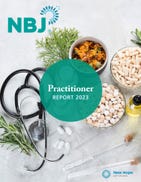
There was a time, early in the last decade, when DNA testing was held up as the holy grail of personalized nutrition. The sequence of our genes was going to tell us the ideal balance of nutrients to optimize our health, and the supplement industry would be integral to his new era of wellness.
Now, nearing the midpoint of the 2020s, the practitioners who might have been ushering consumers into that new era are not showing much support for genetic testing. In a survey featured in Nutrition Business Journal’s new 2023 Practitioner Report, DNA analysis garnered the smallest percentage of practitioners saying they “actively recommend” and the largest percentage who said they “will not use.”
Just 17% of practitioners said they actively recommend genetic at-home testing, well behind the number who recommend microbiome, micronutrient and food sensitivity home tests. The survey looked at practitioners from multiple disciplines and found the greatest support for genetic comes from non-registered dietitian nutrition professionals. The least likely were traditional Chinese medicine doctors.
Medical doctors and osteopathic doctors, 21% of whom recommend DNA testing, were roughly even with the 22% of naturopaths who tell their patients to take the tests. Chiropractors were the most opposed to genetic testing, with 59% saying they “will not use” the tests.
The obvious takeaway from this is that personalized nutrition is not matching the vision heralded in the early 2010s. Most of the personalized nutrition supplement market is represented by quiz-based offerings like Persona and Care/of, and though there are outfits offering customized regimens based on genetic testing, the lack of a broad practitioner support suggests that model could have a low ceiling to growth.
Combining responses from all the disciplines, the greatest support came for biomarker testing, with 31% saying they actively recommend it. That’s not overwhelming support and only roughly even with the percentage who said they “will not use” it, but it’s possible that the limits of the current testing technology, particularly the at-home versions, plays a role. Biomarkers can include levels of micronutrients in the blood. If such test can be made easy and enough and cheap enough to be done frequently and reliably, biomarker testing could be the testing format that truly delivers on all the promise of personalized nutrition, and practitioners would likely have an important role in popularizing it.
Knowing what micronutrients their patients need and having real-time information on the impact of lifestyle on health would be a game changer for how medicine and nutrition work together.
It might even be a holy grail.
 To learn more about the practitioner market, click here to preview and purchase Nutrition Business Journal’s 2023 Practitioner Report.
To learn more about the practitioner market, click here to preview and purchase Nutrition Business Journal’s 2023 Practitioner Report.
About the Author(s)
You May Also Like





